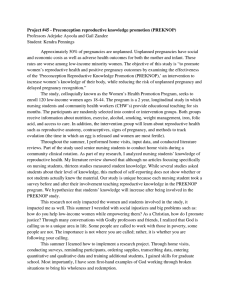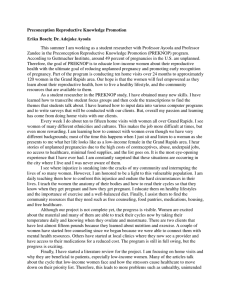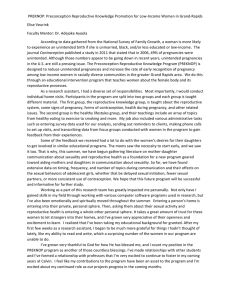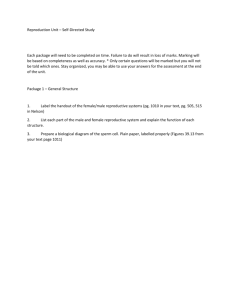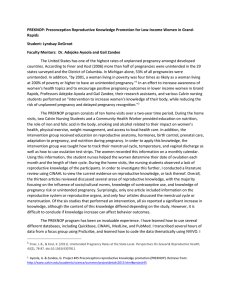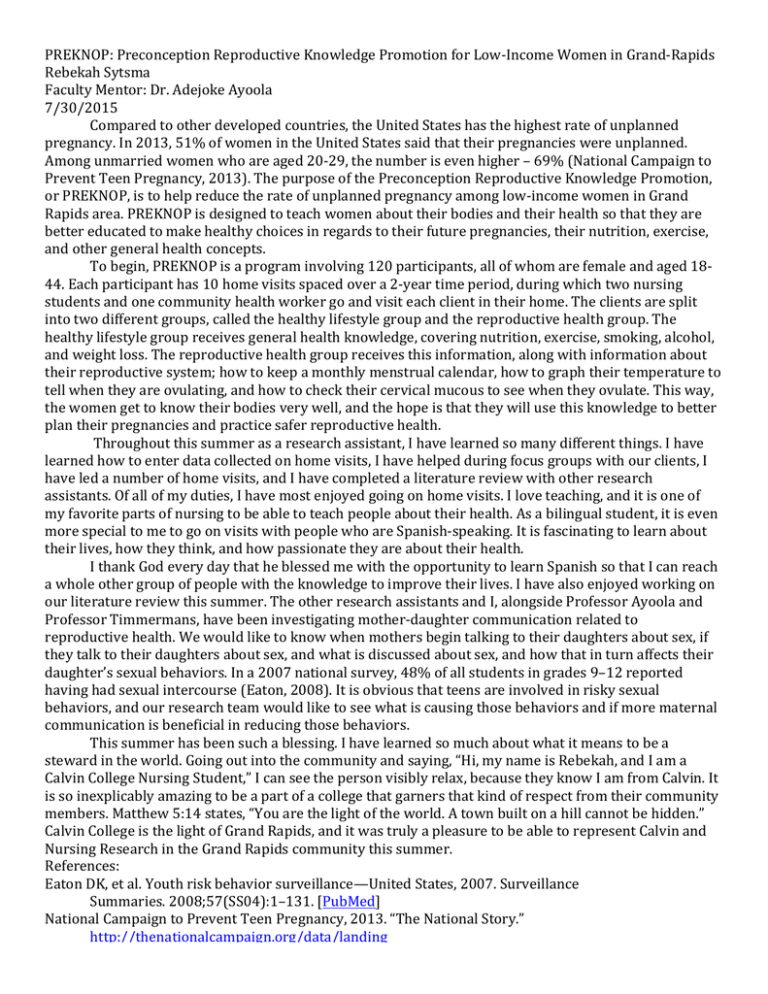
PREKNOP: Preconception Reproductive Knowledge Promotion for Low-­‐Income Women in Grand-­‐Rapids Rebekah Sytsma Faculty Mentor: Dr. Adejoke Ayoola 7/30/2015 Compared to other developed countries, the United States has the highest rate of unplanned pregnancy. In 2013, 51% of women in the United States said that their pregnancies were unplanned. Among unmarried women who are aged 20-­‐29, the number is even higher – 69% (National Campaign to Prevent Teen Pregnancy, 2013). The purpose of the Preconception Reproductive Knowledge Promotion, or PREKNOP, is to help reduce the rate of unplanned pregnancy among low-­‐income women in Grand Rapids area. PREKNOP is designed to teach women about their bodies and their health so that they are better educated to make healthy choices in regards to their future pregnancies, their nutrition, exercise, and other general health concepts. To begin, PREKNOP is a program involving 120 participants, all of whom are female and aged 18-­‐
44. Each participant has 10 home visits spaced over a 2-­‐year time period, during which two nursing students and one community health worker go and visit each client in their home. The clients are split into two different groups, called the healthy lifestyle group and the reproductive health group. The healthy lifestyle group receives general health knowledge, covering nutrition, exercise, smoking, alcohol, and weight loss. The reproductive health group receives this information, along with information about their reproductive system; how to keep a monthly menstrual calendar, how to graph their temperature to tell when they are ovulating, and how to check their cervical mucous to see when they ovulate. This way, the women get to know their bodies very well, and the hope is that they will use this knowledge to better plan their pregnancies and practice safer reproductive health. Throughout this summer as a research assistant, I have learned so many different things. I have learned how to enter data collected on home visits, I have helped during focus groups with our clients, I have led a number of home visits, and I have completed a literature review with other research assistants. Of all of my duties, I have most enjoyed going on home visits. I love teaching, and it is one of my favorite parts of nursing to be able to teach people about their health. As a bilingual student, it is even more special to me to go on visits with people who are Spanish-­‐speaking. It is fascinating to learn about their lives, how they think, and how passionate they are about their health. I thank God every day that he blessed me with the opportunity to learn Spanish so that I can reach a whole other group of people with the knowledge to improve their lives. I have also enjoyed working on our literature review this summer. The other research assistants and I, alongside Professor Ayoola and Professor Timmermans, have been investigating mother-­‐daughter communication related to reproductive health. We would like to know when mothers begin talking to their daughters about sex, if they talk to their daughters about sex, and what is discussed about sex, and how that in turn affects their daughter’s sexual behaviors. In a 2007 national survey, 48% of all students in grades 9–12 reported having had sexual intercourse (Eaton, 2008). It is obvious that teens are involved in risky sexual behaviors, and our research team would like to see what is causing those behaviors and if more maternal communication is beneficial in reducing those behaviors. This summer has been such a blessing. I have learned so much about what it means to be a steward in the world. Going out into the community and saying, “Hi, my name is Rebekah, and I am a Calvin College Nursing Student,” I can see the person visibly relax, because they know I am from Calvin. It is so inexplicably amazing to be a part of a college that garners that kind of respect from their community members. Matthew 5:14 states, “You are the light of the world. A town built on a hill cannot be hidden.” Calvin College is the light of Grand Rapids, and it was truly a pleasure to be able to represent Calvin and Nursing Research in the Grand Rapids community this summer. References: Eaton DK, et al. Youth risk behavior surveillance—United States, 2007. Surveillance Summaries. 2008;57(SS04):1–131. [PubMed] National Campaign to Prevent Teen Pregnancy, 2013. “The National Story.” http://thenationalcampaign.org/data/landing

